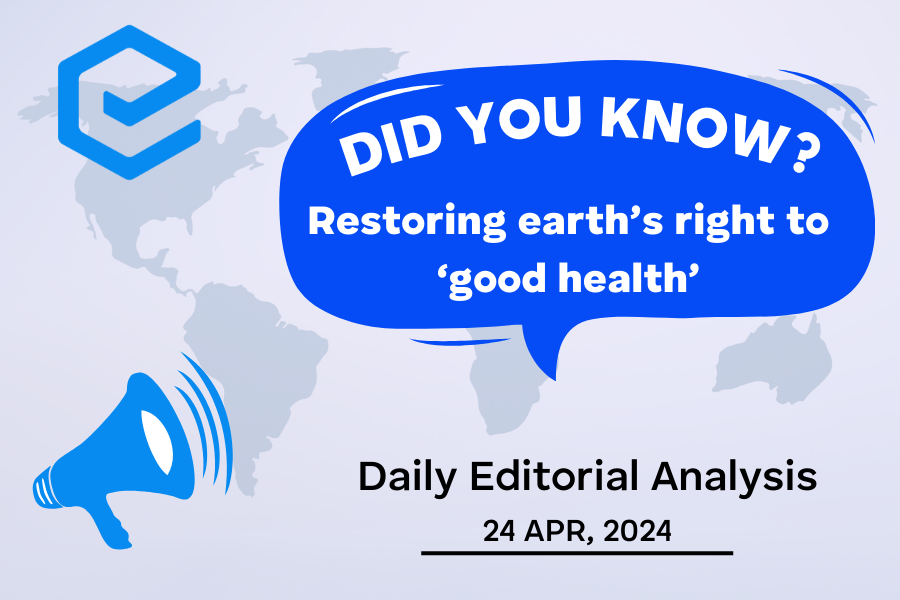
The imperative to restore Earth’s right to ‘good health’ has never been more pressing. With ecosystems under unprecedented stress from human activity, urgent action is needed to mitigate the damage and foster regeneration. This task demands a holistic approach, encompassing sustainable resource management, biodiversity conservation, and climate resilience. Governments, businesses, and individuals must collaborate to implement innovative solutions that prioritize the well-being of the planet and its inhabitants. Only through collective effort and unwavering commitment can we hope to heal the wounds inflicted upon our shared home and ensure a healthier, more sustainable future for generations to come.
Tag: GS-3 Environment
In News: On International Mother Earth Day 2024, UN Secretary-General Antonio Guterres stressed the critical importance of restoring balance with nature. He likened humanity’s actions to those of a delinquent child, causing disorder and harm to both nature and humanity.
Contents
- 1 State of the Global Climate Report:
- 2 Recognition of the Link Between Climate Change and Human Rights:
- 3 India’s Climate Action:
- 4 Significance of Leveraging a Rights-Based Approach to Accelerate Climate Action:
- 5 Frequently Asked Questions (FAQs)
- 5.1 Q1: What does it mean to restore Earth’s right to ‘good health’?
- 5.2 Q2: Why is it important to restore Earth’s right to ‘good health’?
- 5.3 Q3: What are some key challenges in restoring Earth’s right to ‘good health’?
- 5.4 Q4: How can individuals contribute to restoring Earth’s right to ‘good health’?
- 5.5 Q5: What role do governments and businesses play in restoring Earth’s right to ‘good health’?
- 6 In case you still have your doubts, contact us on 9811333901.
State of the Global Climate Report:
- The latest State of the Global Climate Report by the World Meteorological Organization unveils record-breaking levels for most climate change indicators in 2023.
- It confirms 2023 as the hottest year on record and highlights records broken for ocean heat, sea level rise, Antarctic Sea ice loss, and glacier retreat.
Recognition of the Link Between Climate Change and Human Rights:
- European Court of Human Rights decision:
- The European Court of Human Rights found the Government of Switzerland guilty of violating the rights of a group of senior women citizens from a Swiss civil society group called KlimaSeniorinnen.
- The court noted inadequate government actions to curb emissions, failing to protect women against climate change impacts, marking a global precedent.
- Supreme Court of India ruling:
- A recent ruling by the Supreme Court of India acknowledged people’s right ‘to be free from the adverse impacts of climate change’, citing Constitutional articles 14 and 21 as sources.
- This underscores the increasing recognition of the climate crisis as a human rights crisis.
India’s Climate Action:
- India’s observance of International Mother Earth Day on April 22 reflects its cultural reverence for nature.
- The Madras High Court’s declaration of ‘Mother Nature’ as a ‘living being’ underscores India’s commitment to preserve and conserve nature.
- India has achieved significant progress in decoupling emissions from economic growth, meeting two of its Nationally Determined Contribution (NDC) targets.
- However, the country remains highly vulnerable to climate change impacts, necessitating urgent action.
Significance of Leveraging a Rights-Based Approach to Accelerate Climate Action:
- Setting accountability:
- Recognizing climate change impacts within constitutional fundamental rights establishes legal accountability for climate action, focusing on human rights perspectives.
- Accelerating climate action:
- This observation has the potential to hasten climate action, encouraging integrated approaches among government, private sector, and civil society.
- Framework law on climate change:
- It could lead to the adoption of regulations on climate change, enhancing state capacities and strengthening climate governance.
- Knowledge sharing:
- Promoting knowledge exchange among states and union territories fosters coherence in policies and actions.
- Rights-based dialogue:
- Empowering citizen groups and civil society organizations fosters dialogue on environment, biodiversity, and climate action, addressing potential tensions and fostering consensus.
Source: BS
Frequently Asked Questions (FAQs)
Q1: What does it mean to restore Earth’s right to ‘good health’?
A1: Restoring Earth’s right to ‘good health’ refers to efforts aimed at repairing and revitalizing ecosystems, reducing pollution, conserving biodiversity, and mitigating climate change to ensure the planet’s well-being and sustainability.
Q2: Why is it important to restore Earth’s right to ‘good health’?
A2: Restoring Earth’s health is crucial for maintaining a habitable environment for current and future generations. Healthy ecosystems provide essential services such as clean air and water, fertile soil, climate regulation, and support for biodiversity, which are vital for human well-being and survival.
Q3: What are some key challenges in restoring Earth’s right to ‘good health’?
A3: Challenges include addressing climate change, deforestation, pollution, loss of biodiversity, unsustainable resource consumption, and inadequate environmental policies. Overcoming these challenges requires coordinated efforts at local, national, and global levels.
Q4: How can individuals contribute to restoring Earth’s right to ‘good health’?
A4: Individuals can contribute by adopting sustainable lifestyle choices such as reducing waste, conserving energy, supporting eco-friendly products, advocating for environmental policies, volunteering for conservation efforts, and raising awareness about environmental issues.
Q5: What role do governments and businesses play in restoring Earth’s right to ‘good health’?
A5: Governments and businesses play pivotal roles in implementing policies and practices that promote sustainability, regulate pollution, protect natural resources, invest in renewable energy, support conservation initiatives, and foster innovation for sustainable development. Collaboration between these sectors is essential for achieving meaningful progress.
In case you still have your doubts, contact us on 9811333901.
For UPSC Prelims Resources, Click here
For Daily Updates and Study Material:
Join our Telegram Channel – Edukemy for IAS
- 1. Learn through Videos – here
- 2. Be Exam Ready by Practicing Daily MCQs – here
- 3. Daily Newsletter – Get all your Current Affairs Covered – here
- 4. Mains Answer Writing Practice – here

